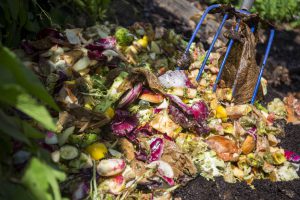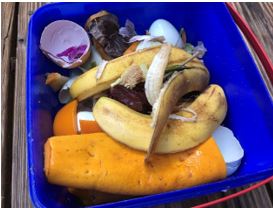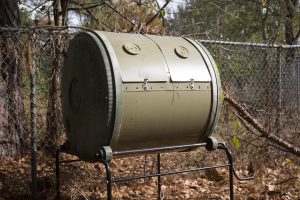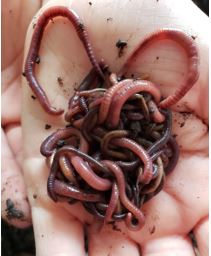 It’s April, which means it’s time to up your Florida-friendly gardening game! A great way to improve your edible garden is to use what you already have lying around to make compost, which boosts the organic matter content of your soil. Grass clippings, yard waste, and fallen leaves can return nutrients and water to the lawn. To make your household even more Florida-friendly, you can use your organic garbage to make a compost pile. This both sends less waste to the landfill and improves the quality and structure of your soil.
It’s April, which means it’s time to up your Florida-friendly gardening game! A great way to improve your edible garden is to use what you already have lying around to make compost, which boosts the organic matter content of your soil. Grass clippings, yard waste, and fallen leaves can return nutrients and water to the lawn. To make your household even more Florida-friendly, you can use your organic garbage to make a compost pile. This both sends less waste to the landfill and improves the quality and structure of your soil.
There are three main methods of composting: slow (“cold”) composting; fast (“hot”) composting; and vermiculture, also known as worm composting. Which one is best for you depends on how quickly you want your compost to be ready and how much attention you want to give it.
Low and Slow
If time isn’t an issue, slow composting might be the place to start. Slow composting means creating a pile of organic matter and then waiting. Over several months, the pile will decompose into compost. The advantage to slow composting is that you don’t have to put as much thought into it as the other methods.
It’s My Compost and I Want It Now!
 Fast composting, also called hot composting, requires more attention and resources. But just as the name sounds, it doesn’t take as long to produce finished compost. Hot composting requires a mix of greens (nitrogen sources like grass clippings, vegetable scraps, and coffee grounds) and browns (carbon sources like leaves, peanut shells, and shredded newspaper). Use twice as much of the browns as of the greens. Also, you should avoid some materials, like meat, bones, or dairy, human or pet waste, and invasive or chemically treated plants.
Fast composting, also called hot composting, requires more attention and resources. But just as the name sounds, it doesn’t take as long to produce finished compost. Hot composting requires a mix of greens (nitrogen sources like grass clippings, vegetable scraps, and coffee grounds) and browns (carbon sources like leaves, peanut shells, and shredded newspaper). Use twice as much of the browns as of the greens. Also, you should avoid some materials, like meat, bones, or dairy, human or pet waste, and invasive or chemically treated plants.
 Fast composting also requires appropriate levels of moisture, air, and heat. Select the location for your pile with these in mind. You can also buy or make a compost bin to help with these attributes. The EDIS publication Recycling Organic Materials to Improve Your Florida-Friendly Edible Landscape has more details and tips for creating and locating your compost pile.
Fast composting also requires appropriate levels of moisture, air, and heat. Select the location for your pile with these in mind. You can also buy or make a compost bin to help with these attributes. The EDIS publication Recycling Organic Materials to Improve Your Florida-Friendly Edible Landscape has more details and tips for creating and locating your compost pile.
I Get By with a Little Help from My Friends (Worms)
 If you’re feeling adventurous, or if space is a limitation, consider vermiculture! Vermiculture is composting with worms, literally feeding worms to make compost out of their manure. To create a vermiculture setup, you will need to acquire worms specifically for composting, such as red wigglers. You will also need two plastic bins to create a habitat for them. Instructions for a do-it-yourself vermiculture setup are available in the above article and from UF/IFAS Extension Orange County here.
If you’re feeling adventurous, or if space is a limitation, consider vermiculture! Vermiculture is composting with worms, literally feeding worms to make compost out of their manure. To create a vermiculture setup, you will need to acquire worms specifically for composting, such as red wigglers. You will also need two plastic bins to create a habitat for them. Instructions for a do-it-yourself vermiculture setup are available in the above article and from UF/IFAS Extension Orange County here.
More resources for backyard composting can be found in the previously mentioned article as well as in EDIS articles such as Compost Tips for the Home Gardener. New publications on this and other Florida-Friendly Landscaping™ topics come out every week at https://edis.ifas.ufl.edu.
 1
1
